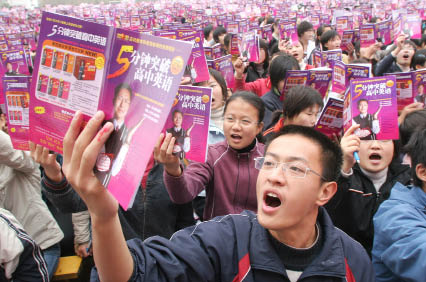| Taking the International Academic Highway
By intern reporter YAN QING
DING Siyu, an honor student at Beijing National Day School, is in her final year of high school. Her bedroom bookshelf is jammed with a row of books for the final year curriculum, but alongside is another pile – examination prep books for TOEFL (Test of English as a Foreign Language), SAT (Scholastic Assessment Test) and the "Go to University in the U.S." series. These days taking the fiercely competitive national college entrance exam is no longer the only option for Chinese students; a growing number believe they should head for an American university.
Let Me Count the Reasons Why
 |
| “English Fever,” rampant in China over recent years, has been particularly virulent among students wanting to improve fluency, and with that their chances of admission to a good foreign university. |
In China there are only 2,000 or so institutions of higher learning, insufficent to meet the demands of a population of 1.3 billion. The picture in the U.S. is entirely different: here, about 300 million people enjoy abundant educational opportunities offered by more than 4,000 universities and colleges. Furthermore, of the world's top 100 universities some 50 are in the U.S., whereas no university on China's mainland even makes the list. Even China's élite Tsinghua University and Peking University rank below 200. Broaden the field to the world's top 500 universities, and there are still only 18 Chinese institutions. The scarcity-induced competition for a high-quality education and the rising parental incomes have combined to make university education overseas an appealing option for Chinese students. These days more than 200,000 students a year are turning their backs on the national college entrance exam, opting instead to pursue their higher education overseas, in the U.S. particularly.
Students whose mediocre test scores seem to presage a mediocre future in China turn to foreign universities with the knowledge that they have good chance of being admitted, even by top-notch ones, if they demonstrate outstanding performance in certain fields. Ding Siyu's cousin Ma Yuanyuan is a case in point. Given Ma's grade record, she was unlikely to get into a good university in China. However, thanks to her excellent social and organizational skills, she was accepted by the University of Denver (84th in the American university rankings). Why? Because Chinese universities are examination-focused while American universities consider an all-round picture of the candidates and are intent on maximizing their potential.
Some Chinese parents send their kids to the U.S. because they like the American-style education that cultivates problem-solving skills. Tang Jiang, who is studying at the University of Tennessee, states candidly: "There are some Chinese universities academically superior in my discipline, but they are utilitarian and often focused on pressing for results. Foreign educators provide a more open learning environment so I can conduct research that really appeals to me."
The Chinese saying "read ten thousand books and travel ten thousand miles" implies that book-learning alone is not enough: you have to go out into the world for knowledge and experience. Some Chinese parents believe spending some time away from home will teach their children independence and broaden their world view.
Yu Chong in Boston University cites another advantage: "Studying abroad is like killing two birds with one stone. The exposure to English is tantamount to taking an additional major and the ability to speak a foreign language is a must-have for the international job market."
Graduates with overseas study experience are more likely to win favor with potential employers; therefore studying abroad is considered an effective route to the ideal career. According to a survey conducted for China Youth Daily, about 42 percent of Chinese students believe that such experience will bring them more opportunities, and 66 percent believe that in the next five years returnees will still enjoy better employment prospects than home-grown graduates.
| 